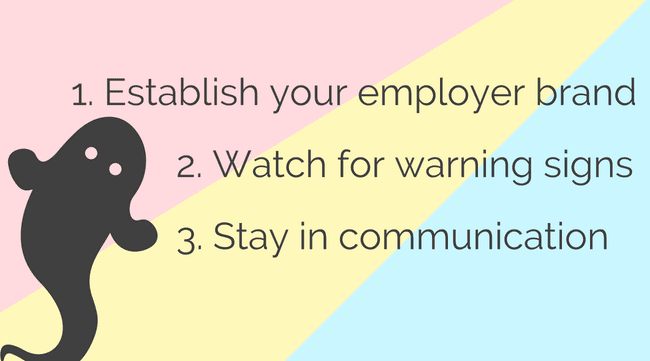
So what’s to blame? Well for one, the booming job market. With the unemployment rate at 3.9% and an abundance of jobs, people feel they can abandon their work commitments for better opportunities. They simply don’t care about showing up. Another contributing factor is today’s communication style. With popular social technologies, face-to-face communication is dwindling before our eyes. Because of the lack of personal contact, prospective employees don’t know how to appropriately communicate with recruiters and hiring managers. Instead of reaching out and dealing with confrontation, they feel entitled to ghost and completely avoid the situation.
For employers, this phenomenon is frustrating, expensive, and stressful. Luckily, there are steps organizations can take to ensure potential hires and even current employees don’t ghost them.
1. Establish your employer brand
Defining your employer brand is crucial when trying to attract the right talent and at the same time, engage your current employees. Your brand is how people see you as an organization. Create a culture that depicts who you truly are and the experiences you want your employees to have. Having a solid distinct brand will make candidates excited and proud to be a part of your team. If you keep your employees involved and satisfied, you will decrease the likelihood of getting ghosted.
2. Watch for warning signs
Pay close attention to people’s career goals. Most candidates whom ghost have short-term goals. Interview them face-to-face and ask how your organization fits into their plans and what motivates them. If they hesitate or don’t seem excited take the cue. Also, look out for candidates who delay start dates, don’t answer your calls or emails, and listen to any changes in the tone of your communications. These are all signals that the candidate is or will ghost you. It’s up to you to decide how to proceed.
3. Stay in communication
Throughout every stage of the application process, you should keep in contact with your candidates via phone or email. Update them on the progress of their application and give any feedback (positive or negative). Also, be upfront about the role and the required responsibilities. Ask if they have any questions or concerns about the position so they know exactly what to expect. If you communicate this earlier on, candidates won’t be surprised or angry if the job they accept isn’t what they thought it was going to be.
Save your reputation
Not only does ghosting leave organizations scrambling to pick up the pieces but it also negatively affects the ‘ghoster’ for many reasons. You’re leaving a very poor impression and it might come back to haunt you (no pun intended). People talk and have connections, and when other employers find out a candidate didn’t show up for a scheduled interview or job, that individual certainly won’t be looked at for any opportunities. Employers will respect your decision that much more if you simply send an email or phone call about canceling or passing up on an opportunity!

Want more information that will help your organization succeed? Subscribe to our JOHNLEONARD blog below and receive the latest advice and tips!
